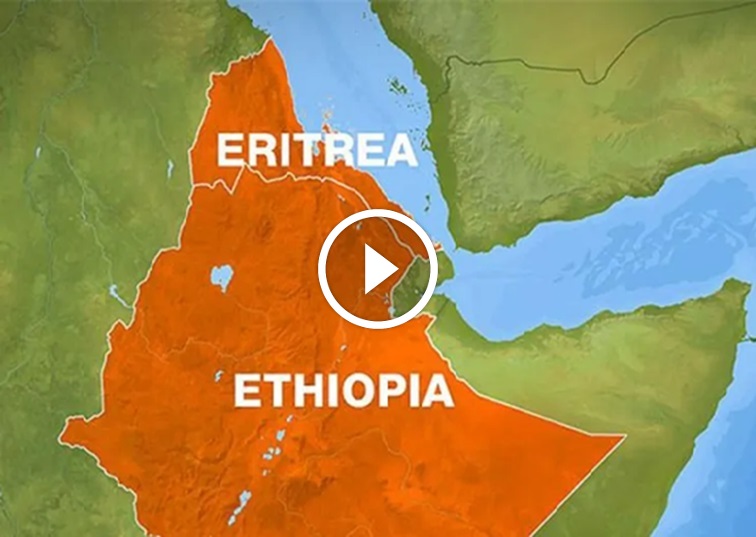Copyright zehabesha

The Aksumite Empire, one of the oldest Christian nations, governed Abyssinia (today’s Ethiopia and Eritrea) in 100-700 A.D. Because of its access to the Red Sea, it was also a major trading hub with the European, Middle Eastern, and Asian trading entities. The emergence of business hubs in the Middle East led to the decline of Aksumite trading hub. There was a gradual occupation of the coastal region by Italian traders until Italy eventually declared Eritrea as its colony in 1890 and ruled over it until 1941. Britain governed Eritrea under its military administration until 1952 before the territory’s reunification with Ethiopia as a federation. Abyssinia, which was a powerful nation, recognized across continents in early A.D., ended up being divided and partially colonized by Italy who created a boundary between Ethiopia and Eritrea. Britain, another European colonizer, respecting the right of the nation to govern itself, handed back Eritrea to Abyssinia (now Ethiopia) via the United Nations. The sad irony is that Abyssinia (now Ethiopia) after thousands of years as an independent entity, is now struggling to define its own identity because of the colonial boundary that was used to divide it against itself. Is Eritrea a free country? Freedom is not an absolute state of being – it is a relative and context-dependent condition shaped by laws, social norms, politics, personal circumstances, and philosophical interpretations. Given the feudal system of governance in Abyssinia in the late 19th century and the relative freedom under the Italian rule and the later British Administration, it is understandable why some Eritreans developed a “liberation” movement when Emperor Haile Silassie abolished Eritrea’s federal status and annexed it as an Ethiopian province in 1962. Later, when the Derg Military Junta took power in Ethiopia, the determination for Eritrea’s independence became even more urgent, and the goal was achieved in collaboration between EPLF, TPLF and other liberation movements which helped overthrow the Derg. The referendum of Eritrea’s independence was carried out only in Eritrea and Eritrean Diaspora, and the rest of Ethiopia (formally Abyssinia) was excluded. The pillars of free nationhood include national sovereignty, democratic governance, rule of law, individual liberties, and civic responsibility. These principles ensure that a nation is not only independent but also just, participatory, and accountable to its people. But in Eritrea most of the bedrocks of freedom and nationhood are missing: Constitution: The Constitution is a fundamental element of national sovereignty because it defines how a nation exercises its authority, governs itself, and protects its autonomy. The Eritrean constitution was ratified in 1997 but, as of 2025, twenty-eight years after the ratification, it has not been implemented! If it is not practiced it does not exist! Governance: Eritrea’s governance is not democratic. It is classified as a centralized authoritarian regime with no functioning democratic institutions, elections, or political pluralism. It is a one-party system – People’s Front for Democratic Justice! But, for all intents and purposes, it does not serve the citizens, there is nothing democratic about it and its judicial system does not serve a democratic institution. Eritrea’s National Assembly which is supposed to serve the legislative body has never convened since 2002. If democracy is not practiced, it does not exist! Law: Eritrea’s rule of law is severely compromised by authoritarian governance, indefinite military conscription, lack of judicial independence, and suppression of civil liberties. Based on all the above Eritrea is far, far away from being a free nation! The worst elements of Eritrea’s autocratic rule include indefinite military conscriptions, absence of elections and constitutional governance, suppression of civil liberties, and widespread human rights abuses. These features make Eritrea’s government one of the most repressive in the world! Leaders, whether of family, of community, or nationality, have the duty to do all they can to protect the well-being and future of those who depend on them. The larger that task, the more incumbent it is on the leader to ensure all the necessary pillars of support are in place. That way a legacy is built to ensure that future generations benefit. That’s what the Aksumites did more than 1000 years ago. Today the same territory along the Red Sea coast is in shambles because of utter lack of legitimacy or responsible leadership. Whether at community, national or international level, peaceful neighborliness is critical for the security and progress of all. Working together on a WIN-WIN strategy creates happiness and success for all and helps build continued focus on co-operation between neighbors. Sadly, the opposite is true for neighbors Ethiopia and Eritrea, today. To be fair, Ethiopia’s Prime Minister, Dr. Abiy Ahmed, Ph.D., reached out to the Eritrean President, Isias Afewerki and broke the ice that had been built between the two countries. This was unexpected and families which had been separated for nearly 3 decades came together and celebrated the return of normal relationships across the border. Sadly, the peace did not last! No doubt in my mind, this was because the Eritrean President did not get what he wanted for himself out of the deal, and Eritreans remain trapped under the suffocating authoritarian rule. Consequences of Ethiopia-Eritrea standoff The breakdown in Ethiopian/Eritrean relations has contributed to regional instability. Because of the clampdown on the public, and lack of media access to the Eritrean public it is difficult to know the level of instability in Eritrea, but within Ethiopia there are inter-ethnic Tigray/Amhara and Amhara/Oromo clashes rooted in the liberation movements of the TPLF and OLF. It is safe to conclude these liberation movements are inspired to this day because of Eritrea’s success to secede from Ethiopia! Sudan and South Sudan are experiencing a lot of internal conflicts. All these plus tensions between Ethiopia and Eritrea pose serious concerns about potential instability in the Horn of Africa. Behind the scenes of Ethiopia/Eritrea standoff are external players who benefit because they get easy access to the Red Sea, Suez Canal, etc. Disrupted economic integration: While there have been ups and downs in the regional stability and economic performance going back centuries, the internationally well-recognized geopolitics of the Horn of Africa and the Red Sea, has only become more prominent over the last 2,000 years. But because of the isolationist, narcissistic behaviors of the Eritrean leadership the once bustling port of Assab is now a shadow of its former self, Eritrea’s economically hangs by a thread, and Ethiopia is struggling to get access to the sea, having been landlocked by Eritrea! Revived border tensions: With its growing population, increased agricultural productivity and increasing need for imports, Ethiopia finds itself denied access to the sea despite all past and present efforts to establish mutually beneficial economic activities. Unless this is resolved, the risk of military confrontation will be inevitable. If the Eritrean government continues to resist mediation for peaceful resolution with Ethiopia by AU and IGAD, then Ethiopia must take any reasonable action to achieve its goal of protecting its national security, restore normal relationship with Eritrea even if that means returning Eritrea its pre-Italian status as a region of Ethiopia. What will be the justification for such an action? Eritrea was part of Ethiopia (Abyssinia) until Italy invaded and colonized it. EPLF overthrew Ethiopian government along with TPLF and declared its independence in 1993 following the referendum which did not involve Ethiopia’s population. That has led to internal conflicts in Ethiopia as other Liberation Fronts – TPLF and OLF – continue to strive for their own independence! So, the so-called international standards of referendum for independence have led to the fragmentation of Ethiopia, and the nation continues to struggle with conflicts since Eritrea’s “Independence”! Neither Eritrea nor Ethiopia are benefiting from the so-called independence of Eritrea. Instead, the hostilities between the two is serving the external entities by giving them control over the Red Sea’s maritime access to the Mediterranean Sea and Indian Ocean! Isaias Afewerki does not represent the interest of Eritreans, not even his own children or grandchildren! Any leader who cares about the future of his own family would build a secure future for them. Eritrea’ leader lacks the capacity of seeing beyond his image of today! There is no active constitutional order; the legislature has been inactive since 2002; there has not been any political election in Eritrea since the referendum of 1993. Eritrea’s rule of law is compromised. There is militarization of the Eritrea instead of democratic governance as Isaias prepares an army to fight against Ethiopia, a country with a population of about thirty times the size of Eritrea’s! By Eritrean government’s account 19,000 of its soldiers died in the 1998-2000 war with Ethiopia. Independent sources claim the loss of Ethiopian fighters was over 80,000, difficult to verify. God forbid, should there be another war, both sides might lose many more fighters! Isaias Afewerki is a 79-year-old, and at that age he has a declining mental capacity which leads to failure to assess the gravity of the hostile relationship with Ethiopia. At that age he is vulnerable to succumbing to other serious health problems. If that happens, because of the lack of democratic process of succession, conflict between rival groups may arise resulting in military takeover and further chaos which most likely will affect Ethiopia even more severely. With a population of over 135 million people whose safety and economic security is vulnerable to a hostile neighbor which has landlocked Ethiopia, it would be abdication of responsibility not to take all the necessary action to protect not only Ethiopians but also the oppressed citizens of Eritrea. For 32 years since Eritrea became “independent” other “Liberation Fronts” have been inspired to achieve similar goals. None of them seem to appreciate the damage done to Eritrea by the choice of “independence” and maintenance of hostility against Ethiopia. But, by virtue of having the Red Sea on its eastern border, Eritrea has barely managed to survive to this day, but imagine independent Amara, independent Oromia, and independent Tigray – all landlocked and surrounded by hostile neighbors, what is the chance of their survival? To all who are supporters of “Liberation Fronts” who may be reading this posting my advice is that you look back at the history of Abyssinia (today’s Ethiopia) and the chaos that it has been experiencing since the Derg’s dictatorship! Ask yourself “what have we gained and what have lost? what legacy are we leaving for our future generations in the last three decades?” How do you plan to move forward – repeat the same destructive strategies over and over again expecting a different outcome? That perfectly fits Albert Einstein’s definition of INSANITY! Since the colonial era on the African Continent, most African countries have looked at Ethiopia as a beacon of hope, based on its victory over Italian colonialists in the Battle of Adwa and maintenance of its independence from colonizers! That gave hope and encouragement to the likes of the late Nelson Mandela, who prevailed over South Africa’s Apartheid regime to win independence. Zimbabwe, formerly Southern Rhodesia, got even more support from Ethiopia and, today it is one of the most stable nations in southern Africa. Kenya, the southern neighbor of Ethiopia, received a lot of political and financial support from the Ethiopian government in its struggle for independence from the British colonial rule. Leaders from Northern Kenya directly communicated with Emperor Haile Silassie and got financial support to their campaign against the efforts to cede Northern Frontier District region to Somalia during that struggle for independence. Today, both Ethiopia and Kenya are benefiting from that intervention – neighbors supporting each other to this day! Many more African nations of today benefited from Ethiopia’s history and are living happily with themselves and their neighbors. Sadly, for the last half a century we have been witnessing Ethiopia, the nation which gave so much hope and success to others, tearing itself apart, using the same tribal identities which joined hands and delivered victory against one of the most powerful Western nations of the time, Italy! The path of human history is circular or, one may call it spiraling forwards or backwards! Africa, the original home of human beings, which had been forgotten or just used for the benefit of other continents, is raising its head today and claiming its rightful place in the world. Because of its history of resilience and its potentials, Ethiopia is at the tip of that spearhead. To all Ethiopians, whatever your tribal identity, my advice is that you stop self-inflicted destruction and come together with a WIN-WIN strategy where all of you, and the entire continent will benefit instead of reliance on external support which has led to the sad situation the whole continent has been facing.



